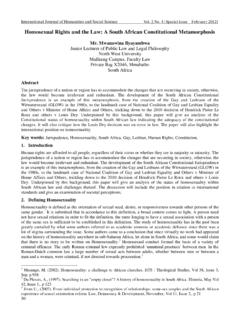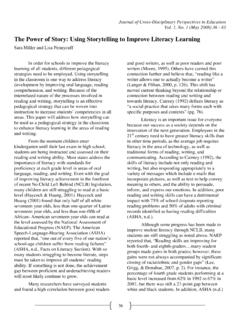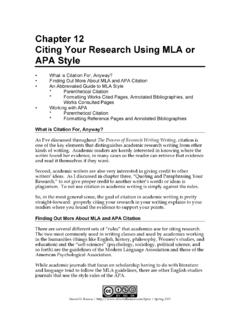Transcription of Evaluating Credibility of Information on the Internet
1 May 2004 Page 1 of 13 Evaluating Credibility ofInformation on the InternetCopyright 2003-2004 Ronald B. StandlerAs school pupils and undergraduate students surf the Internet to find Information , these pupilsand students also need to evaluate the Credibility of the Information that they find. Because myown professional experience is in scientific research, electrical engineering, and law, the discussionin this essay focuses on those three areas. I urge that readers make their own evaluation ofcredibility of sources of Information , instead of blindly relying on peer review, or instead ofignoring non-peer-reviewed , I review the three traditional methods for evaluation of Credibility : (1) peer review,(2) credentials of the author, and (3) writing style.
2 These three traditional methods are easy for thereader, but are not sophisticated and may give misleading results. Second, beginning at page 4,I present methods that readers can use to make their own evaluation of Credibility of Information . Finally, beginning at page 6, I suggest that the Internet may be more useful for deliveringinformation than archival journals in a Traditional Methods of Evaluation1. peer reviewThe traditional standard for Credibility was of a book by a reputable publishing company ( , Mc-Graw-Hill, Wiley,Springer Verlag, Cambridge University Press, etc.) in a peer-reviewed, scholarly journal, such as those published by recognizedprofessional criteria for Credibility only shifts the burden for determining Credibility from the reader to thereviewers chosen by the publisher.
3 I want to emphasize that the Credibility of Information shoulddepend on the Information itself, and not the opinion of some expert who endorsed theinformation. Readers can, and should, make their own evaluation of Credibility , even if the workhas been endorsed by peer May 2004 Page 2 of 13 Some physicians and scientists have submitted fraudulent research results to respectedjournals, which published those fictitious results after approval by peer-review. While one hopesthat such episodes are rare, it is clear that peer-review offers no protection against fraud Alan Sokal, a professor of physics at New York University, deliberately wrote an article fullof rubbish, as a parody of postmodernist literary theory , then submitted his article to Social Text,which published it after approval by This incident is sometimes cited as showingthat the peer-review process is imperfect,3 although I think this incident more importantly showsthe lack of intellectual rigor in some parts of the humanities, which makes whole fields ofknowledge and entire journals, not just an individual article.
4 Not is inherently unscientific to trust an expert, instead of making a personal evaluation of thereasons for the expert s conclusion. Peer review is useful to increase the quality of scholarlyjournals, but peer review is not a substitute for the reader taking the responsibility to evaluate thecredibility of Information in an article. 2. credentials of the authorA commonly used standard is prestige. Has the author earned a doctoral degree from anaccredited university? This is a superficial standard for Evaluating Credibility , but it has its place. For example, I would not consider a book or article about medicine to be credible unless its authorwas either a professor of medicine or a practicing physician, which includes having an degree.
5 Similarly, I would not consider a book or article about law to be credible unless itsauthor was either a professor of law, judge, or a practicing attorney, which includes having anearned degree in law. Having said this, let me also say that (1) appropriate credentials of the authoris no guarantee that his/her article will be either credible or significant and (2) there are rareexamples of people who are self-taught in an area of medicine or law, so that they can produce1 Arnold S. Relman, Lessons From the Darsee Affair, New England Journal of Medicine,Vol. 308, p. 1415-17, 9 June 1983. ( What kind of protection against fraud does peer review offer? TheDarsee affair gives a clear answer: Little or none.)
6 Also see, Eric J. Lerner, Fraud ShowsPeer-Review Flaws, The Industrial Physicist, Vol. 8, Dec 2002, . (Discussing fraudulent data in sixteen paperspublished in prestigious, peer-reviewed journals by Hendrick Sch n.)2 Alan Sokal, Transgressing the Boundaries: Towards a Transformative Hermeneutics ofQuantum Gravity, Social Text, Nrs. 46/47, pp. 217-252, Spring/Summer 1996. Prof. Sokal has a very informative collection of webpages about his hoax .3 See, , Colleen Bell, Critical Evaluation of Information Sources, 20 Jan 2003, . May 2004 Page 3 of 13credible and significant work, despite their lack of formal one evaluates Credibility by examining the credentials of an author, then an anonymouswork has uncertain Credibility .
7 Further, one must be suspicious of anonymous works, because theauthor is apparently unwilling to take personal responsibility for his/her work, which suggests thatthe author knew the work is either poor quality or bogus. When I find Information on the Internet that is posted at a personal website, I expect to find,somewhere in his/her website, both his/her e-mail address and his/her credentials ( , a resumeor ). The absences of an address or credentials makes me distrust the author. Any author who has written at least several papers that were published in respected,peer-reviewed scholarly journals is obviously capable of continuing to produce similar qualitywork, even if that work is posted on the Internet , instead of published in a peer-reviewed one finds a policy statement issued by a professional society, which is allegedly aconsensus of members of that profession and sometimes published anonymously.
8 I tend toignore such pronouncements. Truth does not depend on the number of experts who endorse it. There are many examples in history of science where new ideas were opposed by establishedexperts, who perhaps felt personally threatened either by new and unfamiliar ideas or bytechnology that might make them obsolete. Endorsement by authorities is more characteristic ofreligious dogma than scientific Truth. 3. writing styleOne can easily distinguish scholarly writing from less credible forms of writing by thewriting style. Scholarly writing is distinguished by: citations, either in text or in footnotes. no misspelled words. few, if any, grammar errors. appropriate vocabulary, including the proper technical terms and no slang.
9 Precise writing neither vague statements nor sweeping generalizations; careful use ofabsolute words like always , never , or ideal . statements are internally consistent. alternative interpretations or opposing viewpoints are considered, unless the purpose of thearticle is clearly stated advocacy of one viewpoint. no sarcasm. no ad hominem attacks on other people. includes a date of last revision or date of submission for A date is important because Information or opinions are sometimes made obsolete bysubsequent events or May 2004 Page 4 of 13 use of generic names instead of brand names or summary, scholarly writing displays the erudition of the writer and the careful revisions that thewriter undertook to produce work that he/she felt was of acceptable quality to display is commonly asserted that the hallmark of scholarly writing is large numbers of citations topreviously published material in professional society journals, books, government publications,and other trustworthy sources.
10 Citations make it easy for the reader to verify Information ; clearlyacknowledge earlier discoveries, insights or contributions to the subject matter (thus the authoravoids misrepresenting work by others as the author s original contribution); and also show theauthor s awareness of past work ( , the author s erudition). However, publications in theoretical or experimental science tend to have few citations and ashort bibliography, because these authors concentrate on presenting their own calculations or theirown measurements, with citations to previous publications typically to provide a motive for thenew work and to interpret the new In contrast, review articles in science cite manypublications, to explain the historical evolution of ideas in a subject area and to critically reviewthese publications to spot discrepancies and suggest questions that need to be answered by futurescientific research.




![An Introduction to [height=1em]perusall](/cache/preview/5/1/e/f/8/0/8/5/thumb-51ef8085b0ac5e1f415fb24afb28dea1.jpg)

